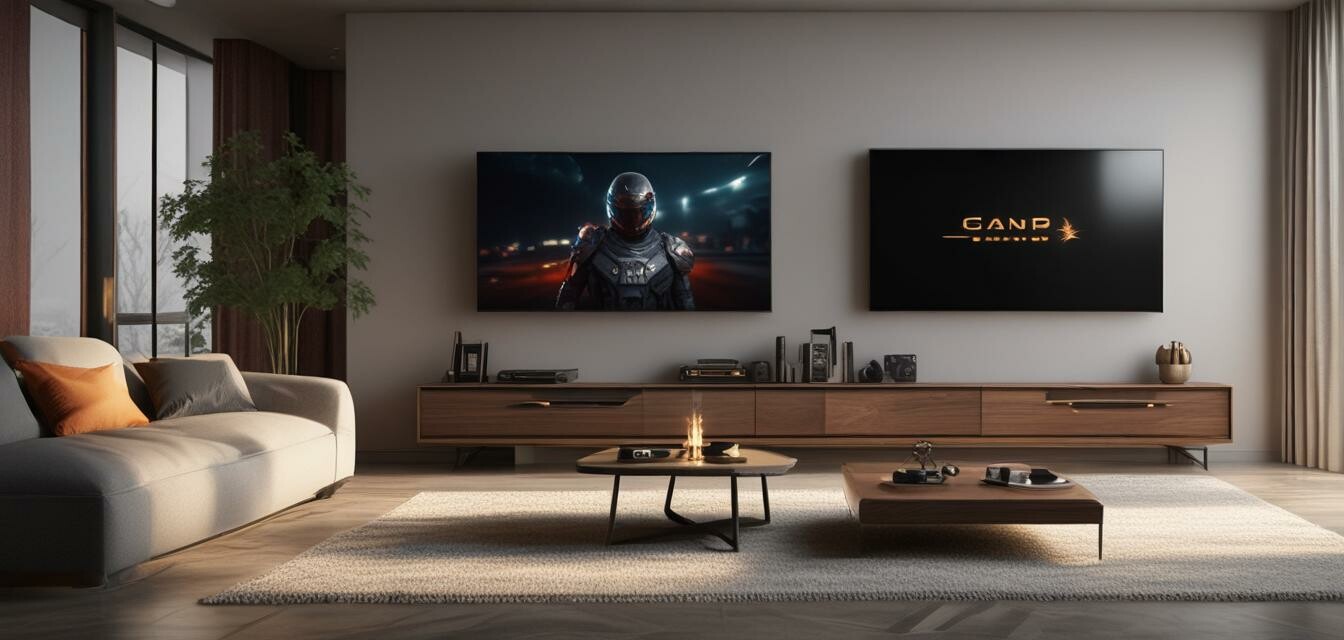
How to choose the best gaming TV for your room size
Key Takeaways
- Room size influences the size of the TV you should choose.
- Different resolution and refresh rates suit varying gaming needs.
- Considerations for distance from the screen are crucial for optimal gaming.
- Technology matters: OLED vs. LED and additional features like VRR can enhance your experience.
- Assess lighting conditions in your room to choose the right display type.
Choosing a gaming TV that fits well within your room is crucial for achieving optimal gameplay and an immersive experience. With a multitude of options on the market, how do you find the best gaming TV for your room size? This article will guide you through the key factors to consider when selecting the right TV for your space.
Understanding room size and TV size compatibility
Before diving into specifications, it's essential to understand the relationship between your room size, the distance from your seating to the TV, and the appropriate TV size. Here’s a simple guideline:
| Room Size | Recommended TV Size |
|---|---|
| Small (up to 10ft x 10ft) | 32-40 inches |
| Medium (10ft x 10ft - 15ft x 15ft) | 40-55 inches |
| Large (15ft x 15ft and up) | 55 inches and above |
How to measure viewing distance
Measuring the distance from your seating area to the TV is the next step. The general guideline suggests:
- For HD TVs: 1.5 - 2.5 times the diagonal size of the TV
- For 4K TVs: 1 - 1.5 times the diagonal size of the TV
Key features to consider
When selecting a gaming TV, the following features play a significant role:
1. Resolution
The resolution of your TV is critical for gaming. While 1080p is common, many gamers are now leaning toward 4K due to its sharpness and detail. Here’s a brief comparison:
| Resolution | Benefits | Best for |
|---|---|---|
| 1080p | Cost-effective, widely supported | Casual gamers |
| 4K | High detail, immersive experience | Serious gamers |
| 8K | Future-proof, incredible clarity | Cutting-edge gaming |
2. Refresh Rate
For smooth gameplay, a refresh rate of 60Hz is the minimum, with 120Hz being ideal for competitive gaming. High refresh rates reduce motion blur and improve responsiveness during fast-paced action.
3. HDR Technology
High Dynamic Range (HDR) boosts contrast and color accuracy, making games look more vibrant and realistic. Consider looking for TVs that support HDR10 or Dolby Vision for the best experience.
The impact of lighting
Your room's lighting conditions can significantly affect your viewing experience. In bright rooms, consider TVs with anti-glare screens or those with higher brightness levels. For darker settings, OLED panels excel, offering deeper blacks and contrast.
Tips for beginners
- Check if the TV includes gaming-specific features like VRR (Variable Refresh Rate) and low input lag for better performance.
- Ensure your TV ports are compatible with your gaming console or PC.
- Consider structure and layout; a wall-mounted TV might free up space in smaller rooms.
Popular display technologies
Understanding the various display technologies can help you make a more informed decision:
- OLED: Offers deep blacks and vivid colors, but may be more expensive.
- LED: More affordable and brighter, making it suitable for well-lit rooms.
- QLED: Combines the benefits of LED and OLED, often delivering impressive brightness and color accuracy.
Pros
- Enhances gaming experience with the right TV size.
- Improves visual clarity and detail with higher resolutions.
- Better refresh rates enhance performance during gameplay.
- Control over room setup and lighting adds to enjoyment.
Cons
- High-end TVs can be cost-prohibitive.
- Some technologies can be overkill for casual gamers.
- Room layout can limit placement options.
Conclusion
Choosing the best gaming TV for your room size involves a thoughtful consideration of the features and specs that will enhance your gaming experience. By understanding your room dimensions, measuring viewing distance, evaluating specific features, and considering display technologies, you can find the perfect TV that elevates your gaming sessions. To learn more about related products, visit our sections on 4K Gaming TVs, HDR Gaming TVs, and OLED Gaming TVs.
